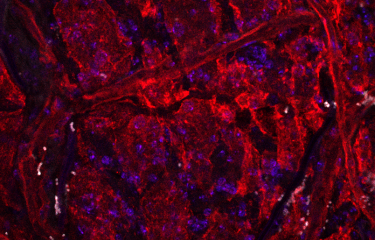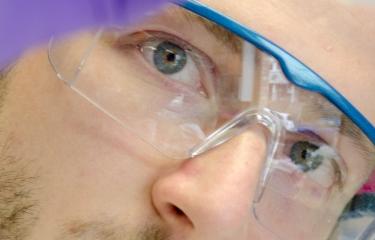A new study led by scientists from the University of Cambridge, the Institut Pasteur, Paris Diderot University, the CNRS and the genetics company 23andMe suggests that our empathy is not just a result of our education and experience but is also partly influenced by genetic variations. These results will be published in the journal Translational Psychiatry on March 12, 2018.
Empathy plays a key role in human relationships. It has two parts: the ability to recognize another person's thoughts and feelings, and the ability to respond with an appropriate emotion. The first part is called "cognitive empathy" and the second part is called "affective empathy".
Fifteen years ago, a team of scientists at the University of Cambridge developed the Empathy Quotient or EQ, a brief self-report measure of empathy. Using this test, which measures both types of empathy, the scientists demonstrated that some of us are more empathetic than others, and that women, on average, are slightly more empathetic than men. They also showed that, on average, autistic people have more difficulties with cognitive empathy, even though their affective empathy may be intact.
The Cambridge team, the Institut Pasteur, Paris Diderot University, the CNRS and the genetics company 23andMe can now report the results of the largest genetics study of empathy using information from more than 46,000 23andMe customers. These people all completed the EQ online and provided a saliva sample for genetic analysis.
The results of this study, led by Varun Warrier1 (University of Cambridge), Professors Simon Baron-Cohen2 (University of Cambridge) and Thomas Bourgeron3 (Paris Diderot University, Institut Pasteur, CNRS), and David Hinds (23andMe), first revealed that our empathy is partly down to genetics. Indeed, at least a tenth of this variation is associated with genetic factors.
The findings also confirm that women are, on average, more empathetic than men. However, this variation is not a result of DNA as no differences were observed in the genes that contribute to empathy in men and women. This implies that the difference in empathy between the sexes is caused by other factors, such as socialization, or non-genetic biological factors, such as prenatal hormone influences, which also differ between the sexes.
Finally, the scientists observed that genetic variants associated with lower empathy are also associated with higher risk for autism.
Varun Warrier explained: "This is an important step towards understanding the role that genetics plays in empathy. But since only a tenth of the variation in the degree of empathy between individuals is down to genetics, it is equally important to understand the non-genetic factors."

Pr. Thomas Bourgeron, head of the Human genetics and cognitive functions unit, at the Institut Pasteur
These results offer a fascinating new perspective on the genetic influences that underpin empathy. Each specific gene plays a small role and this makes it difficult to identify them. The next step is to study an even larger number of people, to replicate these findings and to pinpoint the biological pathways associated with individual differences in empathy.
Finally, Professor Simon Baron-Cohen added: "Finding that even a fraction of why we differ in empathy is due to genetic factors helps us understand people, such as those with autism, who struggle to imagine another person's thoughts and feelings. This empathy difficulty can give rise to a disability that is no less challenging than other kinds of disability. We as a society need to support those with disabilities, with novel teaching methods, work-arounds or reasonable adjustments, to promote inclusion."
Funding
This study was supported by the Autism Research Trust (www.autismresearchtrust.org) and the Templeton World Charity Foundation (TWCF) Inc.
It also benefited from the support of the Medical Research Council, the Wellcome Trust, the Institut Pasteur, the CNRS, Paris Diderot University, the Bettencourt-Schueller Foundation, the Cambridge Commonwealth Trust, and St John's College, Cambridge. It was conducted in association with the NIHR CLAHRC (National Institute for Health Research – Collaboration for Leadership in Applied Health Research and Care) for Cambridgeshire and Peterborough NHS Foundation Trust, the National Human Genome Research Institute of the National Institutes of Health, and the National Science Foundation.
Notes
1 Varun Warrier is a PhD student at the University of Cambridge.
2 Professor Simon Baron-Cohen is Director of the Autism Research Center at the University of Cambridge.
3 Thomas Bourgeron is a Professor at Paris Diderot University. He directs the Human Genetics and Cognitive Functions Unit at the Institut Pasteur/CNRS.
Source
Genome-wide analyses of self-reported empathy: correlations with autism, schizophrenia, and anorexia nervosa, Translational Psychiatry, March 12, 2018
Varun Warrier (1,12), Roberto Toro (2,-4), Bhismadev Chakrabarti (1, 5), the iPSYCH-Broad autism group, Anders D Børglum (6-8), Jakob Grove (6-9), the 23andMe Research Team (10), David A. Hinds (10), Thomas Bourgeron (2,3,4), and Simon Baron-Cohen (1,8,11,12)
1 Autism Research Centre, Department of Psychiatry, University of Cambridge, Cambridgeshire, United Kingdom
2 Institut Pasteur, Human Genetics and Cognitive Functions Unit, Paris, France
3 CNRS UMR 3571: Genes, Synapses and Cognition, Institut Pasteur, Paris, France
4 Université Paris Diderot, Sorbonne Paris Cité, Human Genetics and Cognitive Functions, Paris, France
5 Centre for Integrative Neuroscience and Neurodynamics, School of Psychology and Clinical Language Sciences, University of Reading, Reading, United Kingdom
6 The Lundbeck Foundation Initiative for Integrative Psychiatric Research, iPSYCH, Denmark ;
7 Centre for Integrative Sequencing, iSEQ, Aarhus University, Aarhus, Denmark ;
8 Department of Biomedicine - Human Genetics, Aarhus University, Aarhus, Denmark
9 Bioinformatics Research Centre, Aarhus University, Aarhus, Denmark
10 23andMe Inc., Mountain View, California 94043, USA
11 CLASS Clinic, Cambridgeshire and Peterborough NHS Foundation Trust (CPFT), Cambridgeshire, United Kingdom





